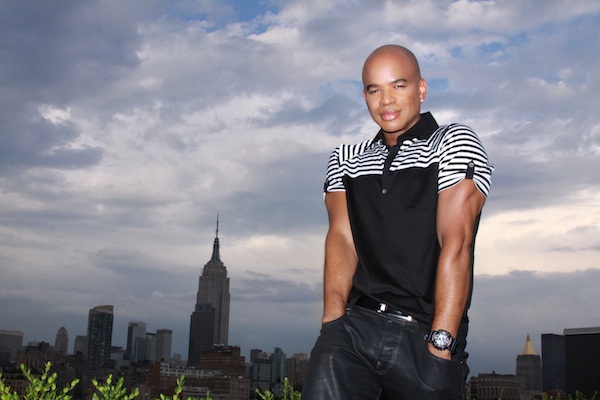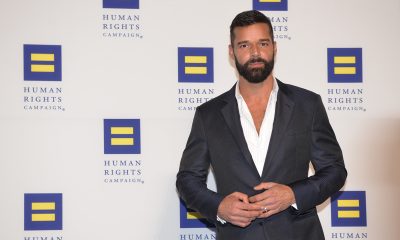Arts & Entertainment
Born again music
Gay former gospel singer finds success in electro-dance pop


Chris Willis, who’s single, averages about 40 weekends a year traveling. (Photo by Marco Ovando courtesy BIG Management)
Paris is apparently a lucky name for singer Chris Willis.
The Ohio-born singer/songwriter had a great run in contemporary Christian music in the ‘90s; one of his biggest gigs was working as a backup singer for gospel legend Twila Paris on her seminal 1993 “Beyond a Dream Tour” though later he established himself as a go-to session singer and had his own gospel album out.
Later in Paris, France he collaborated with French producer/DJ David Guetta and the two enjoyed an unusually rich partnership that resulted in the No. 1 dance hits “Love is Gone”, “Give it All You Got” (both 2007) and “Gettin’ Over You,” a 2010 collaboration with Fergie and LMFAO.
Now Willis, who essentially rebuilt his music career from scratch after coming out around the new millennium, is branching out solo once again. His hit “Louder (Put Your Hands Up)” was a No. 1 hit in 2010 on the Billboard dance chart. Last year’s “Too Much in Love” went to No. 4. Last month it went to No. 1 on the DJ Times Dance/Crossover chart.
They’re both on his latest EP “Premium: Songs From the Love Ship, vol. 1,” which dropped in November. He’s planning two more installments and spends about three weekends a month on the road, performing 30-minute sets in dance clubs all over the world. He’ll be in Washington on Feb. 21 for a media blitz, though no performances are planned.
He remembers a pivotal turning point during a break in performing on a cruise ship in the late ‘90s — the feelings are eerily similar to those shared by many other gays who grew up in evangelical Christianity.
“I was always thinking, ‘How do I reconcile this with what I hear in sermons and what I read in the Bible,’” Willis, 43, says during a phone interview from his Atlanta home. “All those years living in the closet I tried to pray it away and lived with all this doubt, guilt and shame. I couldn’t reconcile the process either. It felt odd in a way because to a degree, I always had a certain sense of peace in my soul. I had to really learn to adopt a philosophy that there are no mistakes and for whatever reason, this is the hand I’ve been dealt. I started to realize that nothing positive was ever going to happen unless I accepted it.”
Despite the inner struggle, Willis says he enjoyed his years in Nashville working with gospel acts like Paris, Mark Lowry, Amy Grant and others (he’s also cut vocals for Dusty Springfield, Ricky Martin, Kelly Rowland and Quincy Jones). He considers several of Grant’s former back-up singers such as Donna McElroy, Vickie Hampton and Kim Fleming, dear friends who helped him network wildly in the ‘90s.
“I have such respect for those years and that time,” he says. “It was a great grooming period for me and though it was tough personally and internally, I learned to take the good with the odd and bad and embrace and appreciate the whole pie.”
After moving to New York, he started to rebuild his career almost from scratch. He had “almost no contact” with people from his Nashville years and says there’s almost zero crossover between the gospel and electro/dance industry brass. Never mind that the industry paradigm was, of course, crumbling around him — he did one album for Warner Brothers that was shelved. His second, an eponymous 1996 release, did modestly well on Star Song, in imprint eventually bought by EMI.
Willis met Guetta in Miami in 2000. They clicked musically and Willis is featured on the title cut to Guetta’s 2002 debut, “Just a Little More Love.” It was only a modest international hit but it was the start of the second major phase of Willis’s career.
Despite his successes — Willis says clubgoers all over the world know his songs and sing along when he makes appearances — it’s still a highly competitive field.
“I can make a great impact in the electro market but on the charts, you’re up against the latest remixes from Beyonce or Rihanna and it’s really intimidating,” he says. “As an artist, it obviously makes me a little nervous, but I love making music and taking that risk and chance. And you know, I tend not to pay so much attention to the charts. It’s a great way to avoid being disappointed. I’m just happy to be able to work and travel and I have many loyal supporters who help keep me going.”
Books
Love or fear flying you’ll devour ‘Why Fly’
New book chronicles a lifetime obsession with aircraft

‘Why Fly’
By Caroline Paul
c. 2026, Bloomsbury
$27.99/256 pages
Tray table folded up.
Check. Your seat is in the upright position, the airflow above your head is just the way you like it, and you’re ready to go. The flight crew is making final preparations. The lights are off and the plane is backing up. All you need now is “Why Fly” by Caroline Paul, and buckle up.

When she was very young, Paul was “obsessed” with tales of adventure, devouring accounts written by men of their derring-do. The only female adventure-seeker she knew about then was Amelia Earhart; later, she learned of other adventuresome women, including aviatrix Bessie Coleman, and Paul was transfixed.
Time passed; Paul grew up to create a life of adventure all her own.
Then, the year her marriage started to fracture, she switched her obsession from general exploits to flight.
Specifically, Paul loves experimental aircraft, some of which, like her “trike,” can be made from a kit at home. Others, like Woodstock, her beloved yellow gyrocopter, are major purchases that operate under different FAA rules. All flying has rules, she says, even if it seems like it should be as freewheeling as the birds it mimics.
She loves the pre-flight checklist, which is pure anticipation as well as a series of safety measures; if only a relationship had the same ritual. Paul loves her hangar, as a place of comfort and for flight in all senses of the word. She enjoys thinking about historic tales of flying, going back before the Wright Brothers, and including a man who went aloft on a lawn chair via helium-filled weather balloons.
The mere idea that she can fly any time is like a gift to Paul.
She knows a lot of people are terrified of flying, but it’s near totally safe: generally, there’s a one in almost 14 million chance of perishing in a commercial airline disaster – although, to Paul’s embarrassment and her dismay, it’s possible that both the smallest planes and the grandest loves might crash.
If you’re a fan of flying, you know what to do here. If you fear it, pry your fingernails off the armrests, take a deep breath, and head to the shelves. “Why Fly” might help you change your mind.
It’s not just that author Caroline Paul enjoys being airborne, and she tells you. It’s not that she’s honest in her explanations of being in love and being aloft. It’s the meditative aura you’ll get as you’re reading this book that makes it so appealing, despite the sometimes technical information that may flummox you between the Zen-ness. It’s not overwhelming; it mixes well with the history Paul includes, biographies, the science, heartbreak, and exciting tales of adventure and risk, but it’s there. Readers and romantics who love the outdoors, can’t resist a good mountain, and crave activity won’t mind it, though, not at all.
If you own a plane – or want to – you’ll want this book, too. It’s a great waiting-at-the-airport tale, or a tuck-in-your-suitcase-for-later read. Find “Why Fly” and you’ll see that it’s an upright kind of book.
The Blade may receive commissions from qualifying purchases made via this post.
Theater
Out actor Kevin Cahoon on starring role in ‘Chez Joey’
Arena production adapted from Broadway classic ‘Pal Joey’

‘Chez Joey’
Through March 15
Arena Stage
1101 Sixth St., S.W.
Tickets start at $93
Arenastage.org
As Melvin Snyder in the new musical “Chez Joey,” out actor Kevin Cahoon plays a showbiz society columnist who goes by the name Mrs. Knickerbocker. He functions as a sort of liaison between café society and Chicago’s Black jazz scene circa 1940s. It’s a fun part replete with varied insights, music, and dance.
“Chez Joey” is adapted from the Broadway classic “Pal Joey” by Richard Rodgers and Lorenz Hart. It’s inspired by John O’Hara’s stories based on the exploits of a small-time nightclub singer published in The New Yorker.
A warm and humorous man, Cahoon loves his work. At just six, he began his career as a rodeo clown in Houston. He won the Star Search teen division at 13 singing songs like “Some People” from “Gypsy.” He studied theater at New York University and soon after graduating set to work playing sidekicks and comedic roles.
Over the years, Cahoon has played numerous queer parts in stage productions including “Hedwig and the Angry Inch,” “La Cage aux Folles,” “Rocky Horror” as well as Peanut in “Shucked,” and George the keyboardist in “The Wedding Singer,” “a sort of unicorn of its time,” says Cahoon.
Co-directed by Tony Goldwyn and the great Savion Glover, “Chez Joey” is a terrific and fun show filled with loads of talent. Its relevant new book is by Richard Lagravenese.
On a recent Monday off from work, Cahoon shared some thoughts on past and current happenings.
WASHINGTON BLADE: Is there a through line from Kevin, the six-year-old rodeo clown, to who we see now at Arena Stage?
KEVIN CAHOON: Anytime I want to land a joke in a theater piece it goes back to that rodeo clown. It doesn’t matter if it’s Arena’s intimate Kreeger Theatre or the big rodeo at the huge Houston Astrodome.
I was in the middle stadium and there was an announcer — a scene partner really. And we were doing a back and forth in hopes of getting laughs. At that young age I was trying to understand what it takes to get laughs. It’s all about timing. Every line.
BLADE: Originally, your part in “Chez Joey” Melvin was Melba who sings “Zip,” a clever woman reporter’s song. It was sort of a star feature, where they could just pop in a star in the run of “Pal Joey.”
CAHOON: That’s right. And in former versions it was played by Martha Plimpton and before her Elaine Stritch. For “Chez Joey,” we switched gender and storyline.
We attempted to do “Zip” up until two days before we had an audience at Arena. Unexpectedly they cut “Zip” and replaced it with a fun number called “I Like to Recognize the Tune,” a song more connected to the story.
BLADE: Wow. You must be a quick study.
CAHOON: Well, we’re working with a great band.
BLADE: You’ve played a lot of queer parts. Any thoughts on queer representation?
CAHOON: Oh yes, definitely. And I’ve been very lucky that I’ve had the chance to portray these characters and introduce them to the rest of the world. I feel honored.
After originating Edna, the hyena on Broadway in “The Lion King,” I left that to do “Hedwig and the Angry Inch” as standby for John Cameron Mitchell, doing one show a week for him.
Everyone thought I was crazy to leave the biggest musical of our time with a personal contract and getting paid more money that I’d ever made to get $400 a week at the downtown Jane Street Theatre in a dicey neighborhood.
At the time, I really felt like I was with cool kids. I guess I was. And I never regretted it.
BLADE: When you play new parts, do you create new backstories for the role?
CAHOON: Every single time! For Melvin, I suggested a line about chorus boys on Lakeshore Drive.
BLADE: What’s up next for Kevin Cahoon?
CAHOON: I’m about to do the New York Theatre Workshop Gala; I’ve been doing it for nine years in a row. It’s a huge job. I’ll also be producing the “Cats: The Jellicle Ball” opening on Broadway this spring; it’s a queer-centric uptown vogue ball with gay actor André de Shields reprising his role as “Old Deuteronomy.”
BLADE: There’s a huge amount of talent onstage in “Chez Joey.”
CAHOON: There is. I’m sharing a dressing room with Myles Frost who plays Joey. He won accolades for playing Michael Jackson on Broadway. We’ve become great friends. He’s a miracle to watch on stage. And Awa [Sal Secka], a D.C. local, is great. Every night the audience falls head over heels for her. When this show goes to New York, Awa will, no doubt, be a giant star.
BLADE: Do you think “Chez Joey” might be Broadway bound?
CAHOON: I have a good feeling it is. I’ve done shows out of town that have high hopes and pedigree, but don’t necessarily make it. “Chez Joey” is a small production, it’s funny, and audiences seem to love it.

The Capital Pride Alliance held the annual Pride Reveal event at The Schuyler at The Hamilton Hotel on Thursday, Feb. 26. The theme for this year’s Capital Pride was announced: “Exist. Resist. Have the audacity!”
(Washington Blade photos by Michael Key)










































